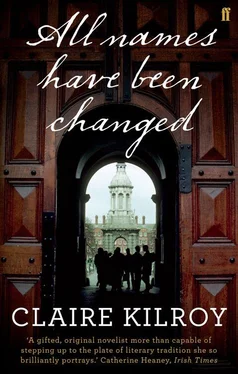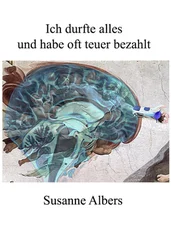Claire Kilroy - All Names Have Been Changed
Здесь есть возможность читать онлайн «Claire Kilroy - All Names Have Been Changed» весь текст электронной книги совершенно бесплатно (целиком полную версию без сокращений). В некоторых случаях можно слушать аудио, скачать через торрент в формате fb2 и присутствует краткое содержание. Год выпуска: 2010, Издательство: Faber & Faber, Жанр: Современная проза, на английском языке. Описание произведения, (предисловие) а так же отзывы посетителей доступны на портале библиотеки ЛибКат.
- Название:All Names Have Been Changed
- Автор:
- Издательство:Faber & Faber
- Жанр:
- Год:2010
- ISBN:нет данных
- Рейтинг книги:5 / 5. Голосов: 1
-
Избранное:Добавить в избранное
- Отзывы:
-
Ваша оценка:
- 100
- 1
- 2
- 3
- 4
- 5
All Names Have Been Changed: краткое содержание, описание и аннотация
Предлагаем к чтению аннотацию, описание, краткое содержание или предисловие (зависит от того, что написал сам автор книги «All Names Have Been Changed»). Если вы не нашли необходимую информацию о книге — напишите в комментариях, мы постараемся отыскать её.
All Names Have Been Changed — читать онлайн бесплатно полную книгу (весь текст) целиком
Ниже представлен текст книги, разбитый по страницам. Система сохранения места последней прочитанной страницы, позволяет с удобством читать онлайн бесплатно книгу «All Names Have Been Changed», без необходимости каждый раз заново искать на чём Вы остановились. Поставьте закладку, и сможете в любой момент перейти на страницу, на которой закончили чтение.
Интервал:
Закладка:
Claire Kilroy
All Names Have Been Changed
For my mother Helen
PART I Michelmas Term, October
1 Sinne fianna fáil. We are soldiers of destiny
Nobody wrote about September like Glynn. It was his month. You could say it was his season. September intensified the lush sadness pervading his work, made it complete, corporeal, laden; the late summer drawing to a close, the sun forsaking our remote shores, the long hard winter setting in (he compared it once to an animal settling down to die). A spirit of contented melancholy swept through his eight startling novels, swelling their pages like sea air. You could almost taste it. I could almost taste it.
Abandonment; that was Glynn’s great subject. Abandonment and longing. He wrote about anguish with a lucidity that was exhilarating. The autumn equinox in particular, the sun crossing the celestial equator, referred to in three of his novels, ( Prussian Blue , p. 140, Gorsefire , p. 98, Farm Animals , p. 20), mirrored the condition of his narrators — each one of them was the Hanging Man, suspended on the cusp between love and hate, fear and hope, remorse and defiance. Oh, his incomparable skies. He sketched them almost offhandedly with a few deft words, evoking them as metal: pewter, silver, iron. Our northerly latitude became him. The cast of Irish light penetrated his every sentence; our fitful island weather infiltrated his every noun. During the decade or so that he spent in the States, academics and critics eagerly speculated as to the nature of his first ‘American novel’, but Glynn’s absence from his native country only compounded his vision of it, and it was whilst there, in Brighton, Connecticut, that he produced his masterpiece, Hibernia , land of winter, home.
It was an October day when we formally met Glynn. His season had latterly expired. The sky that day was bright, chill, coppery. Listen to me — I am as bad as him. The workshop looked whiter than it ever had. We had been waiting there for four weeks by then, and had grown accustomed to that attic room, familiar with the variations of light on the floor, its many shades of disappointment. Glynn was the best part of a month late and we had all but given up on him, so implausible did it seem that a writer as great as he should join us in a room as modest as that. It was a problem of scale.
When the front door slammed shut on the ground floor, the seven of us — there were seven of us left by then and, although it is hard to imagine, for a time I wasn’t the lone male — the seven of us raised our heads, startled deer. The four, my four, had already begun their descent, but they about-turned without consultation and resumed their seats where they waited in silence, hands folded in laps, looking for all the world as innocent as if they hadn’t budged in the first place, they of little faith.
We all of us listened intently to Glynn’s tread on the wooden staircase, losing impetus with every step, but gaining substance. His approach lasted for ever and sounded so weary that he might well have been dragging his exhausted bones towards us for weeks, slouching across desert sands, icy plains, no different to the way in which we had found ourselves dragged towards him, when you think about it, and I have.
They were unbearable, those last few seconds spent waiting for him to appear. We were trapped up there on the top floor, no escape. What had we summoned? What baleful spirit, what tormented soul? Too late to call a halt now. We were as charged as thunderclouds before we laid eyes on him, our imaginations sparking every which way, a meteor shower. We could have seen anything, anything at all. That is the effect he had on us. Glynn had been absent from the public domain for some time. We hardly knew what to expect.
It was almost a relief when he finally materialised. It had almost been too much. Guinevere said she found herself blinking back tears upon his entrance, Faye felt a rush of blood to the head. Aisling thought she was going to pass out. Her face went whiter still, if such a thing can be imagined. God only knows what raced through the dark alleys of Antonia’s fraught mind — over a year had passed since she and Glynn had last come face to face. Not that the rest of us were aware of their connection at the time. Their history, I suppose you might call it.
If Glynn was surprised to see Antonia there, he betrayed not a trace. What a figure he cut. It looked to me that he hadn’t slept during his month-long absence. His red eyes surveyed us from the doorway, then he stalked to the chair at the top of the room and collapsed onto it heavily, throwing his person down like a sack of coal, like so many goods and chattels.
How unlike himself he looked, how unlike his publicity photograph, that is. Older, uglier, yet more impressive. Every inch proclaimed his status as tortured heroic artist — drawn, crumpled, glowering, spent. It was a simultaneously appalling and satisfying sight. September had evidently gone hard on him that year. Afterwards, months afterwards, we discussed how surprising it had been to encounter him there, despite it being precisely where he was supposed to be. He had stared at us like he loathed and pitied us in equal measure. Empty desks floated like icebergs in the no man’s land between us. This first meeting is an event I shall return to.
Six of Glynn’s novels were set — are set — by the coast, specifically the east coast of Ireland. No sublime Atlantic sunsets for him, no horizons charged with promise, no Americas. The man could in a sentence reduce you to the state of a child by invoking that universal response of helplessness when confronted with a vast and indifferent sky, its impact doubled by the vast and indifferent sea heaving beneath it, growing steadily darker. Glynn was uncannily adept at capturing the feeling of being lost. It is a difficult predicament to write.
One of the many singularities about the man is that the older he got, the more piercing his evocations of childhood became. A further singularity is that the more piercing these evocations became, the more familiar they became, to the extent that it could have been your own childhood he was describing. My own childhood, I mean. Though Glynn was over thirty years my senior, it seemed it was my childhood he was writing about. The incident with the stillborn calf in The Common-place Book , for example — the very same thing had happened to me. Or at least I thought it had, but thought so on a second reading.
I see now I replaced my childhood with Glynn’s depictions — they were so vivid as to eclipse mine. Sometimes I even think I grew up on a Wicklow headland with lighthouses and what have you overlooking the Irish Sea and not on our low-lying few acres of Mayo bog dotted about with rushes and reddled sheep, blue for us, red for the McGuigans. I went so far as to tell Guinevere about it once, how as a boy I fell asleep at night listening to waves crash against rocks. What waves, what rocks? And yet I hear them to this day. Storms were my favourite. ‘There is nothing to beat a good storm,’ I informed Guinevere, adopting the iambic cadence favoured by Glynn, hungry for her attention. I don’t know what possessed me to impart all this. It didn’t even feel like a lie. You could say I was part-Glynn by the time I made it to House Eight that October, so thoroughly had I absorbed him by then, so thoroughly had I been absorbed. To a degree we were all part-Glynn, the five of us, and he thrived on that, for a time.
Clearly it is problematic to conclude that if a great artist delineates the intimate contours of your mind, then you and that great artist are of a mind, yet forging that link is precisely what the poetical imagination does, it is precisely the locus of its power. Glynn’s aesthetic vision was so expansive that it bled into our own, where it was welcomed, where it was invited to flourish. The five of us, strangers then, had found ourselves in the jaws of an inimical world, and Glynn’s response to it made sense of our own. No longer did we feel alone, that is the plain truth of it. Our subsequent devotion was nothing short of pure. Somewhere along the line, art stopped being important to the rest of the country, failed in relevance, ceased to be a faith system. Not to us, though. And certainly not to Glynn. He must have known what he represented to us. He had been young, after all, once.
Читать дальшеИнтервал:
Закладка:
Похожие книги на «All Names Have Been Changed»
Представляем Вашему вниманию похожие книги на «All Names Have Been Changed» списком для выбора. Мы отобрали схожую по названию и смыслу литературу в надежде предоставить читателям больше вариантов отыскать новые, интересные, ещё непрочитанные произведения.
Обсуждение, отзывы о книге «All Names Have Been Changed» и просто собственные мнения читателей. Оставьте ваши комментарии, напишите, что Вы думаете о произведении, его смысле или главных героях. Укажите что конкретно понравилось, а что нет, и почему Вы так считаете.












